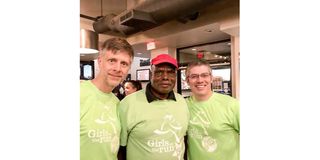Key lessons from Henry Rono’s life

Kenyan athletics legend Henry Rono (centre).
What you need to know:
- Rono and Steve Muchoki were honoured by Kenya's First President Mzee Jomo Kenyatta at State House, Mombasa two days before Kenyatta died on August 22 in 1978 after directing that the two be given eight grade cows, eight quality sheep or goats and a piece of land but that was never to be.
There are many things we can learn from Henry Rono’s life. Perhaps the most important one is the need to understand a fellow human being beyond the physical appearance.
When someone is known to have made it in life mostly financially and then he or she starts experiencing problems from all corners, we would do well to still respect and encourage the person. In life, Rono was a person you could not just ignore, even if he spent the better part of his life in physical and spiritual agony, which he always tried to absorb with dignity.
Rono and Steve Muchoki were honoured by Kenya's First President Mzee Jomo Kenyatta at State House, Mombasa two days before Kenyatta died on August 22 in 1978 after directing that the two be given eight grade cows, eight quality sheep or goats and a piece of land but that was never to be.
The government should do justice to the two men and another one — 1988 Olympics 5,000m champion John Ngugi. Former president, Daniel arap Moi, directed Ngugi be given 50 acres of land in Nyandarua, but nothing was done.
Like many Kenyans of goodwill, it is my sincere hope that President William Ruto will honour these great men. Former American President Donald Trump made history when he posthumously pardoned Jack Johnson, the first black heavyweight boxing champion of the world (1908-1915) who had been accused by the white establishment of “moving around with white women” which was against the law at the time.
Weathered many storms
With time, government after government was reminded through US Congress and Senate that it was time to pardon Johnson, who died in 1946, posthumously since he was buried with the burden of injustices.
Silvester Stallon and a close friend of Donald Trump led a group of heavyweight boxers and a great-great- grand niece of Johnson in seeking that elusive pardon, and it was granted.
When I learnt Rono was coming back to Kenya after spending 33 years in the United States, my major concern was to bring him and Muchoki together, which I managed to.
As I took some photos of the two great Kenyans, now aged, I realised how important life was irrespective of what we go through.
They had weathered many storms in different ways for over four decades since they were promised what has yet to reach them. Rono has exited the scene to join his maker whose secrets and mysteries no one can fathom.
We can only imagine what happens with the souls which leave the body, and whether they join with others to discuss the past. Rono and Mzee Kenyatta would have very interesting encounters.
Muchoki was so happy to be with Rono and some members of his family (children and grandchildren). One of the young girls, upon learning that Muchoki was a retired boxer, said she, too, wanted to be a boxer.
Muchoki was happy to be at Rono's house in Nairobi’s South C estate relaxing and chatting. The boxer remembers Rono as a very cool person, mostly preferring to be alone. The two trained together near Kiganjo Police Training College in Nyeri before the 1978 All Africa Games.




